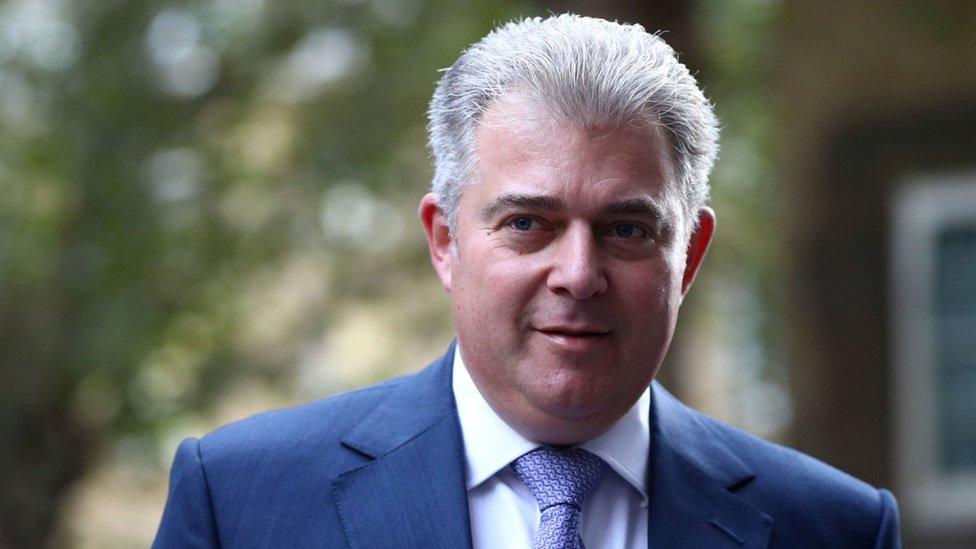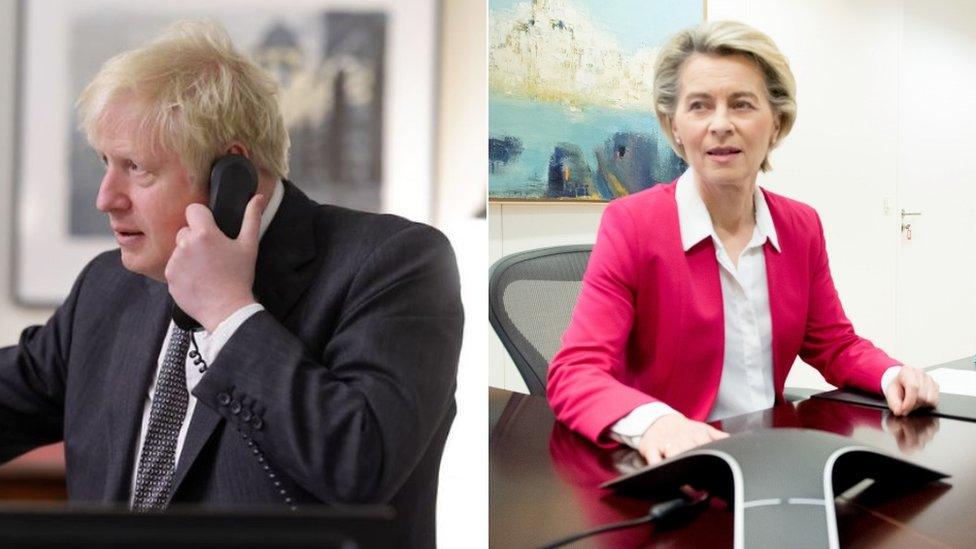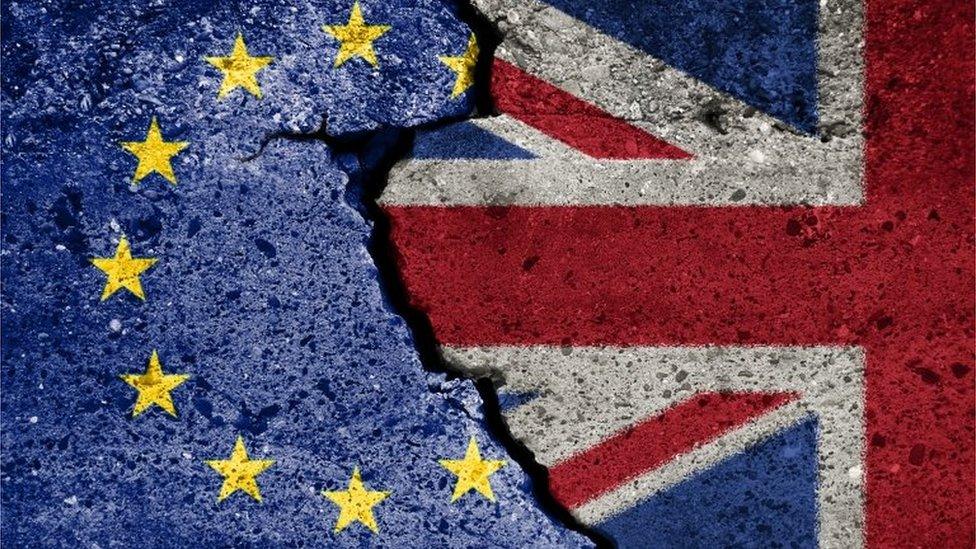Brexit: NI secretary says coming days are crucial
- Published

Brandon Lewis said the government is working to get a "solid solution" that covers everything for Northern Ireland
The next few days are "crucial" for the UK and EU to try to reach a post-Brexit trade deal, NI Secretary Brandon Lewis has said.
On Tuesday, the two sides reached agreement in principle on how rules in the withdrawal agreement on NI will be implemented.
This is separate from the negotiations on a trade deal.
Boris Johnson will travel to Brussels this week for talks with EU Commission President Ursula von der Leyen.
Asked if the political will was there on both sides to reach a trade deal, Mr Lewis said: "We'll have to see what happens."
He insisted the government would work for a "full and fair" agreement with the EU.
He told BBC News NI that Number 10 had taken the "right approach" in confirming it would withdraw controversial plans to override parts of the Brexit legislation relating to Northern Ireland, as a result of the agreement outlined on Tuesday.
Mr Lewis had previously admitted that inserting the legislation into the Internal Market Bill would break international law in a "limited and specific way".
The details of the agreement have not been published but are expected to be rubber stamped in the coming days.
They will apply regardless of whether the two sides can agree a trade deal.
What is the Northern Ireland Protocol?
It is designed to prevent a hard border in Ireland - or even any new checks at the Irish border - and will come into operation on 1 January 2021.
It does this by effectively keeping Northern Ireland in the EU's single market for goods.
This will mean products entering Northern Ireland from the rest of the UK will be subject to new checks and control - the so-called Irish Sea border.
The precise nature of the checks was being negotiated in parallel with the trade talks through a Joint Committee - Cabinet Office Minister Michael Gove is expected to set out further details of the agreement in the Commons on Wednesday.
It will also mean when relevant EU laws are amended or new ones are drawn up, they will also apply in Northern Ireland.
Under the plan, NI will leave the EU customs union with the rest of the UK at the end of this year, but will continue to enforce the EU's customs code at its ports.

Taoiseach (Irish PM) Micheál Martin welcomed the decision by the British government to remove the clauses from the Internal Market Bill.
However he warned that the possibility of no trade deal was very real if "something doesn't break that over the next day or two".
"This isn't about choreography," he said, as he urged the UK and EU to break the political deadlock.
First Minister Arlene Foster said her party would await specific details on the Protocol arrangements before passing judgement.

Prime Minister Boris Johnson will travel to Brussels later this week to meet European Commission President Ursula von der Leyen
Mrs Foster, the Democratic Unionist Party (DUP) leader, said it was important that any agreement on the Protocol ensured NI businesses could trade freely into Great Britain.
"Getting supermarket containers from Great Britain into Northern Ireland also has to work and is very important for us," she added.
"If the right deal has been agreed, those issues around unfettered access for NI to GB and GB to NI will be dealt with, that so-called at risk category will be dealt with too, but let's see what the detail says."
Deputy First Minister Michelle O'Neill said the Northern Ireland Executive will still "remain vigilant" as it awaits the outcome of the trade deal negotiations in Brussels.
Stormont ministers met on Tuesday morning to discuss the state of play between the UK and EU.
"We've said on many occasions that the negotiations have been described as crunch point, but clearly we are running out of road - it boils down to the point that we need clarity," Ms O'Neill said.

We don't yet have the full details of what has been agreed.
But this development is at least as important to Northern Ireland as a trade deal.
That's because NI companies will still have privileged access to the UK and EU markets whether or not there is a trade deal.
The major point of jeopardy for NI has been the risk of disruption to trade caused by the new Irish Sea border.
Today's breakthrough should mean that border is managed in a way which minimises disruption.
Business groups have given a cautious welcome but they still want more time to implement the looming changes.

Ulster Unionist leader Steve Aiken said "no amount of self-congratulatory statements" would make up for how NI had been treated throughout the negotiations.
"I hope the EU and UK Government will now at least have the decency to share this information with local businesses quickly to allow them to prepare for whatever has been agreed," he added.
SDLP leader Colum Eastwood said he hoped it was a "sign of progress toward a broader trade deal".
"In many ways, clarity around the operation of the Ireland protocol in more important for Northern Ireland based businesses, and will have a more acute impact, than the results of trade talks."
Alliance deputy leader Stephen Farry described it as an "encouraging development", but warned that a so-called "grace period" to extend time to implement the Protocol was still necessary.
The secretary of state would not comment when asked by BBC News NI if the government had asked for a so-called "grace period" for GB-NI businesses, if a trade deal is not ratified before 1 January.
- Published7 December 2020
